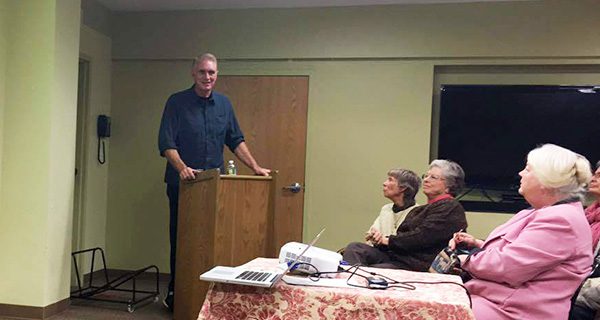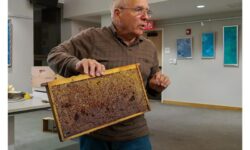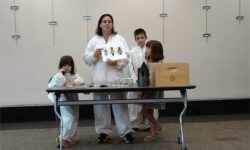[ccfic caption-text format="plaintext"]
By Katrina Margolis
Hometown Weekly Reporter
Peter Hauschka has an impressive resume. An Associate Professor at Harvard University, a research associate at the Boston Children’s Hospital, and the first ever football player from Amherst College to play in the NFL, the Needham local has now turned to his next big adventure: beekeeping.
Hauschka manages around ten hives in addition to growing fruits and vegetables that he turns into jams and jellies. Not one to leave the details forgotten, Hauschka gave a presentation titled “Honey Bees and Mankind – Beekeeping Through the Ages” at the Dover Library. He began with just a little bit of history, including the co-evolution of insects and plants over the past 500 million years. He covered the social behavior of honey bees, as well as gave an in depth exploration of the pheromones and chemical secretions of bees.
While many know the basics of honeybees, Hauschka offered some little known facts about the important pollinators. “Bees collect pollen and it is about 40 percent protein and the only source of amino acids of that kind for them,” he explained. “They can fly for about an hour on one tank of honey.”
Something so ubiquitous to us today, he revealed how extraordinary honey really is. It takes about one million flights to make one pound of honey.
Hauschka discussed the inner-workings of the beehive, a social structure that includes workers (all female) and drones (all male). In 1679, scientists believed that the hive was run by a king bee, since there was a male monarch. However, clearly all of that work could not be done by a man; modern science has revealed the head of the hive to be a queen. Hauschka also revealed that honey bees aren’t native to North America and in fact were brought over by settlers to Jamestown. They took to the climate and natural setting incredibly well, since there are accounts of bees in New England as early as 1640.
Of course, he also discussed the problems bees are currently facing. A number of natural causes, including drought and disease, have contributed to the demise of bee populations, but the worst culprits are pesticides. Recently, even Bayer admitted that small amounts of exposure over time can lead to the collapse of a hive. These pesticides are banned in the EU, which makes sense, considering about one third of our food depends on food pollination.
However, they are still legal in the United States.
The passion Hauschka has for his bees is clear, and he encouraged anyone interested to get involved. There are about 300 people in the Norfolk County Beekeepers Association, and weekly meetings see up to 100 people in attendance. They also offer classes, and by the end of 10 weeks anyone can be ready to go to begin their own beekeeping practice.

























